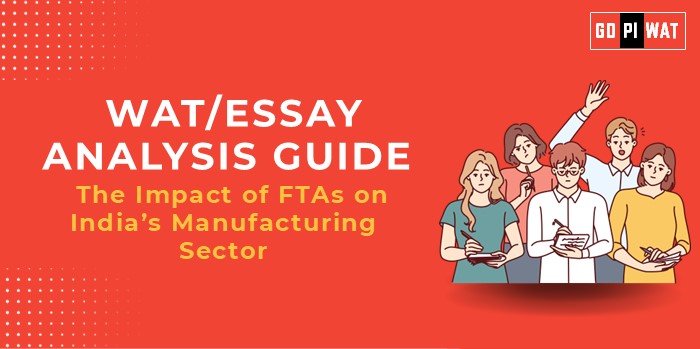📋 Written Ability Test (WAT)/Essay Analysis Guide
📝 Topic: The Impact of FTAs on India’s Manufacturing Sector
🌐 Understanding the Topic’s Importance
🌏 Significance: FTAs influence India’s manufacturing sector by shaping trade patterns, fostering economic integration, and enabling export-driven growth. Their inclusion in B-school essays allows students to explore the intersection of international trade and domestic development.
📝 Effective Planning and Writing
- ⏳ Time Allocation:
- 🕒 Planning: 5 minutes
- 🖊️ Writing: 20 minutes
- 🔍 Review: 5 minutes
- 📋 Preparation Tips: Include verified trade data, examples of FTA-driven benefits, and key challenges like trade deficits or non-tariff barriers.
💡 Introduction Techniques for Essays
- ⚖️ Contrast: “While FTAs have boosted exports by 20.75%, they’ve also led to a growing trade deficit, reflecting a dual-edged impact.”
- 🔑 Solution-Based: “Balancing domestic competitiveness with market liberalization is key to maximizing the benefits of FTAs.”
🛠️ Structuring the Essay Body
- 🏆 Achievements:
- 📈 Export Growth: Merchandise exports to FTA nations grew by 20.75% over the last five years.
- 🔧 Technology Transfer: Sectors like automotive and electronics benefited from advanced technologies through FTAs.
- 🏭 Sectoral Boost: Industries like textiles, pharmaceuticals, and specialty chemicals experienced significant growth.
- 🌍 Global Competitiveness: Positioned India as a viable alternative in the “China Plus One” strategy.
- ⚠️ Challenges:
- 📉 Trade Deficit: Grew to $30 billion in the first half of 2023 with FTA partners.
- 🏭 Import Competition: Domestic sectors like steel and electronics struggle against cheaper imports.
- 📜 Non-Tariff Barriers: Stringent standards hinder full FTA benefits.
- 🚧 Infrastructure Gaps: Limited logistics reduce competitiveness.
- 🌟 Future Outlook:
- 📦 Improve Infrastructure: Streamline supply chains through investments in logistics.
- 💡 Foster Innovation: Expand R&D and adopt new technologies to enhance manufacturing capabilities.
- 🤝 Strengthen Partnerships: Leverage FTAs for sector-specific growth strategies.
📄 Concluding Effectively
- ⚖️ Balanced Approach: “FTAs bring both opportunities and risks; success hinges on addressing domestic challenges and leveraging global partnerships.”
- 🌍 Global Perspective: “By learning from nations like Vietnam, India can strengthen its manufacturing base while navigating FTA complexities.”
📊 Analyzing Successes and Shortcomings
🎯 Key Successes
- 📈 Export Growth: Merchandise exports to FTA nations grew by 20.75%.
- 🔧 Technology Transfer: Enabled access to advanced technologies in key sectors.
- 🏭 Sectoral Boost: Growth in textiles, pharmaceuticals, and specialty chemicals.
- 🌍 Global Value Chains: Positioned India as part of the “China Plus One” strategy.
⚠️ Ongoing Shortcomings
- 📉 Trade Deficit: A $30 billion deficit with FTA partners highlights imbalances.
- 🏭 Import Competition: Domestic sectors face challenges from cheaper imports.
- 📜 Non-Tariff Barriers: Hinder seamless trade despite agreements.
- 🚧 Infrastructure Deficits: Reduce competitiveness in manufacturing and exports.
🌍 Global Context
- 🇻🇳 Vietnam: Increased exports and attracted investments through FTAs, strengthening electronics and textiles.
- 🇲🇽 Mexico: Leveraged NAFTA to build a robust automotive industry.
🔑 Recommendations for Sustainable Progress
- 🚧 Enhance Domestic Competitiveness:
- 🏗️ Invest in infrastructure and logistics to streamline supply chains.
- 💡 Expand the Production Linked Incentive (PLI) schemes to high-potential sectors.
- 📚 Strengthen R&D capabilities to foster innovation and reduce imports.
- ⚖️ Balanced Trade Negotiations:
- 🛡️ Include provisions to mitigate trade imbalances, such as safeguard clauses.
- 📜 Advocate for reducing non-tariff barriers during negotiations.
- 📦 Promote Export-Oriented Policies:
- 🤝 Facilitate MSME participation in global value chains.
- 🎯 Develop sector-specific strategies for high-growth industries.
📚 Sample Short Essays (100 Words Each)
- 📋 Balanced Perspective: “India’s FTAs have fostered export growth and market access, yet challenges like trade deficits and competitive pressures persist. Strategic reforms in manufacturing and careful negotiation can unlock greater benefits.”
- 🔍 Solution-Oriented: “FTAs offer opportunities for India to integrate into global value chains, but addressing competitiveness and reducing trade imbalances will be critical for long-term gains.”
- 🌍 Global Comparison: “India’s FTA experience highlights the need for domestic reforms, as seen in Vietnam’s success, where targeted policies transformed its manufacturing sector through trade agreements.”


